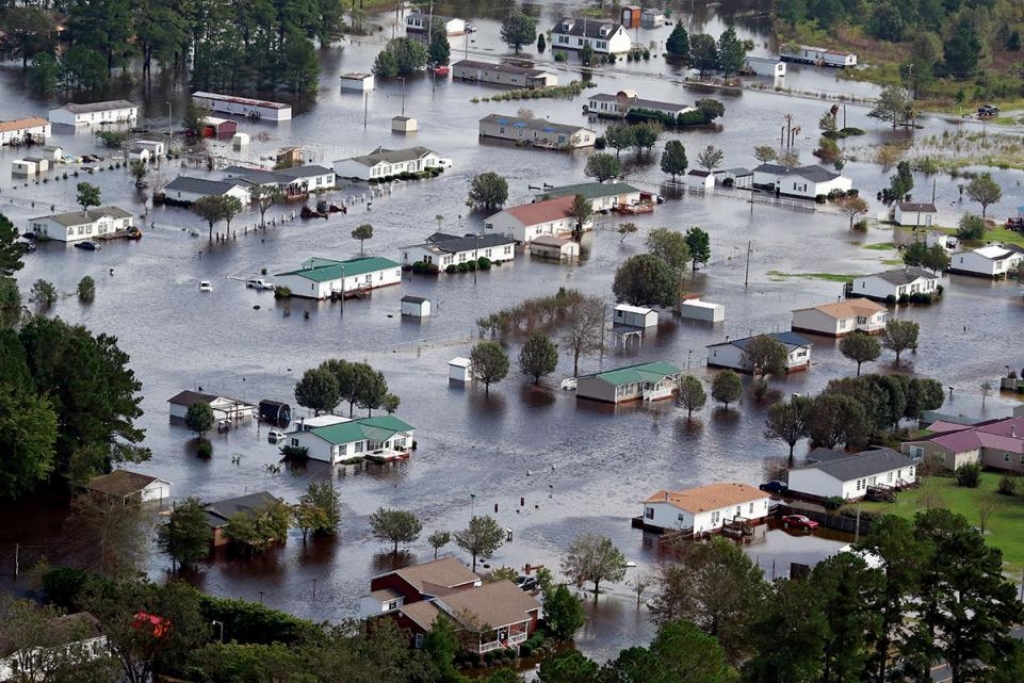
Monday morning was not normal. My wife and I spent the weekend watching WRAL’s radar as our house in North Durham was just skirting the upper edge of Hurricane Florence. It was stormy outside, but we didn’t get much rain and the wind was just enough to dislodge some dead branches that had been asking to come down for months. We thought the storm was over for us. Early Monday morning the rain began. It poured in to our crawl space and to the family room. I spent the morning frantically running back and forth between bailing the water out of the crawl space and running the wet vac in the family room to catch as much water as possible before it flooded the entire room. Then the tornado warnings started coming. The crawl space effort was abandoned as I huddled in the stairwell with my wife, my 2 year old, my newborn twins, and my dog waiting for the warning to lift. The water just kept coming. I spent the afternoon tearing out wet carpet so it wouldn’t sit and mold. We are fortunate, because that looks like it’s going to be all the damage for us. Some of North Carolina is still underwater.
What we know from previous storms is that the impacts will fall hardest on our most vulnerable communities and rebuilding is a years-long task.
I’ve been in communication with a number of you about the storm’s impact in your community. If we have not yet been able to be in touch, please reach out and let us know how the storm has impacted your community. We have a lot of work ahead of us, and we don’t even begin to know the scale yet. Conservative estimates are putting the figure between $17-22 billion. While that tells quite a staggering story, what we know, because we’re still recovering from Hurricane Matthew, is that those figures don’t really tell the full story of the storm’s impact. What we know from previous storms is that the impacts will fall hardest on our most vulnerable communities and rebuilding is a years-long task. Not only do my wife and I have the savings to withstand the cost of our minimal repairs should insurance not cover it, we also had the resources to buy the house near the top of our hill. The bottom of our street was evacuated because the Eno River overflowed its banks. That story is playing out in far more intense ways in many of our communities across the state.
Below are funds, resources and ways to get involved to help folks who need immediate assistance, but prepare to be in this for the long haul.
- The North Carolina Community Foundation has reactivated its Disaster Relief Fund. NCCF’s footprint includes the New Bern and Wilmington areas.
- The Cumberland Community Foundation has activated its Hurricane Florence Relief and Recovery Fund to support relief and recovery efforts in Cumberland County.
- The Outer Banks Community Foundation is accepting contributions to its Disaster Relief Fund.
- Foundation For The Carolinas has activated a Hurricane Florence Response Fund.
- The North Carolina Disaster Relief Fund is now accepting contributions to assist with immediate unmet needs of Hurricane Florence victims.
- The Community Foundation of Henderson County is accepting donations to its Disaster Relief, Recovery and Rebuilding Fund (DR3). For more information, visit CFHCforever.org, or email info@CFHCforever.org.
- The Community Foundation of NC East has activated a Hurricane Florence Relief Fund.
- For companies wanting to provide funding support for their employees during disasters, E4E Relief is available to help organizations set up Employee Relief Funds.
For individuals who find themselves unemployed as a result of Hurricane Florence in the following counties, Beaufort, Brunswick, Carteret, Craven, New Hanover, Onslow, Pamlico and Pender, can file an application for Disaster Unemployment Assistance (DUA) by October 17, 2018. Individuals may contact DES by calling 1-866-795-8877 from 8AM to 5PM to apply for DUA benefits. For local resources and questions, individuals can contact their County Emergency Management Agencies or call 211 for information on shelters, food assistance, and storm recovery help.
We have been working with partner agencies to document resources as they become available and will continue to do so as we hear about them. If there are any missing resources that you are aware of, please email Tyran Hill at thill@nchousing.org so that we can get them to the people that need them most. Once the flood waters subside, we will need to be about that slow, consistent work of rebuilding, and it is going to take all of us.








